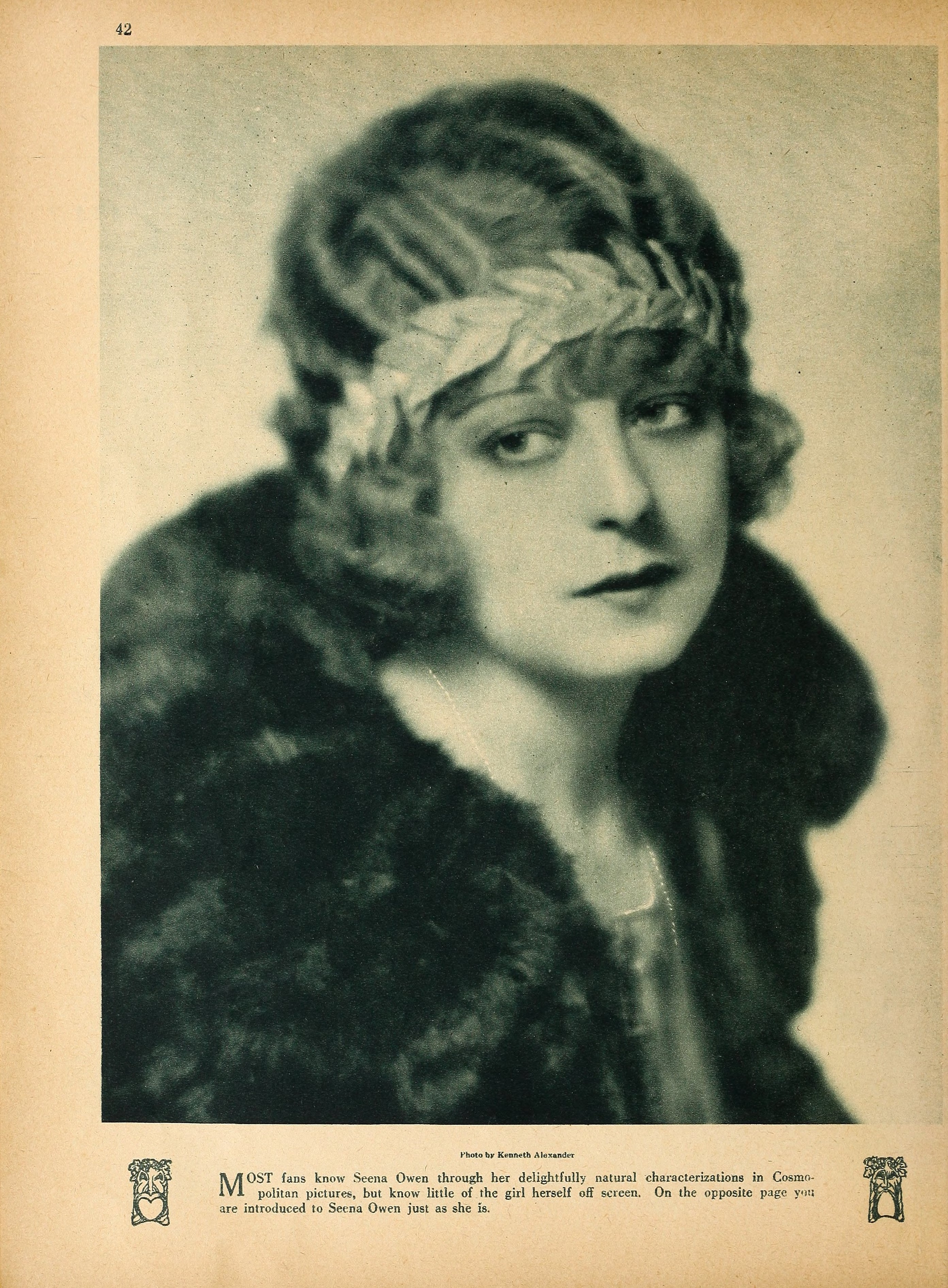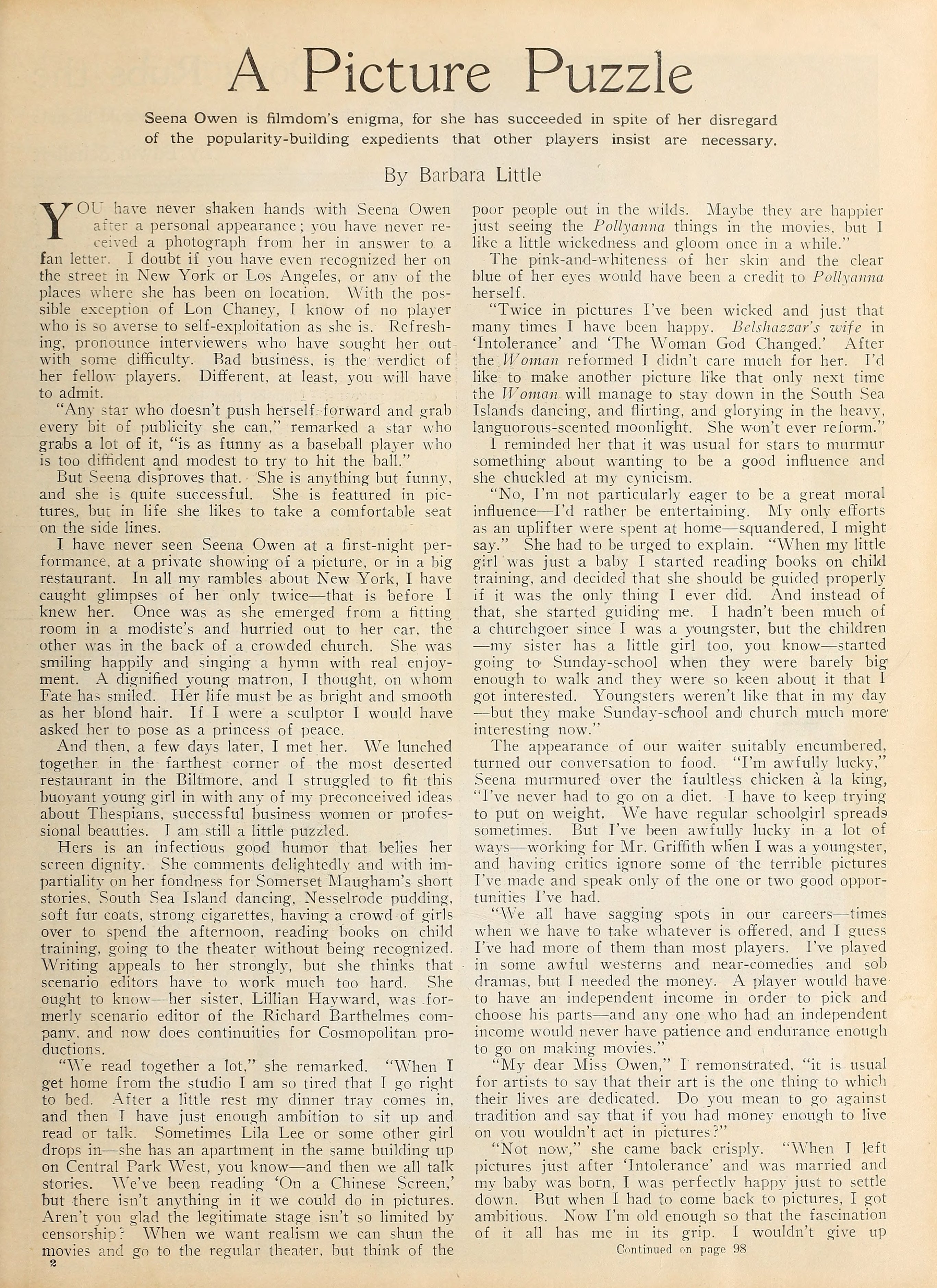Seena Owen — A Picture Puzzle (1923)

You have never shaken hands with Seena Owen after a personal appearance; you have never received a photograph from her in answer to a fan letter. I doubt if you have even recognized her on the street in New York or Los Angeles, or any of the places where she has been on location.
by Barbara Little
With the possible exception of Lon Chaney, I know of no player who is so averse to self-exploitation as she is. Refreshing, pronounce interviewers who have sought her out with some difficulty. Bad business, is the verdict of her fellow players. Different, at least, you will have to admit.
“Any star who doesn’t push herself forward and grab every bit of publicity she can,” remarked a star who grabs a lot of it, “is as funny as a baseball player who is too diffident and modest to try to hit the ball.”
But Seena disproves that. She is anything but funny, and she is quite successful. She is featured in pictures, but in life she likes to take a comfortable seat on the side lines.
I have never seen Seena Owen at a first-night performance, at a private showing of a picture, or in a big restaurant. In all my rambles about New York, I have caught glimpses of her only twice — that is before I knew her. Once was as she emerged from a fitting room in a modiste’s and hurried out to her car, the other was in the back of a crowded church. She was smiling happily and singing a hymn with real enjoyment. A dignified young matron, I thought, on whom Fate has smiled. Her life must be as bright and smooth as her blond hair. If I were a sculptor I would have asked her to pose as a princess of peace.
And then, a few days later, I met her. We lunched together in the farthest corner of the most deserted restaurant in the Biltmore, and I struggled to fit this buoyant young girl in with any of my preconceived ideas about Thespians, successful business women or professional beauties. I am still a little puzzled.
Hers is an infectious good humor that belies her screen dignity. She comments delightedly and with impartiality on her fondness for Somerset Maugham’s short stories, South Sea Island dancing, Nesselrode pudding, soft fur coats, strong cigarettes, having a crowd of girls over to spend the afternoon, reading books on child training, going to the theater without being recognized. Writing appeals to her strongly, but she thinks that scenario editors have to work much too hard. She ought to know — her sister, Lillian Hayward, was formerly scenario editor of the Richard Barthelmess company, and now does continuities for Cosmopolitan productions.
“We read together a lot.” she remarked. “When I get home from the studio I am so tired that I go right to bed. After a little rest my dinner tray comes in, and then I have just enough ambition to sit up and read or talk. Sometimes Lila Lee or some other girl drops in — she has an apartment in the same building up on Central Park West, you know — and then we all talk stories. We’ve been reading On a Chinese Screen, but there isn’t anything in it we could do in pictures. Aren’t you glad the legitimate stage isn’t so limited by censorship? When we want realism we can shun the movies and go to the regular theater, but think of the poor people out in the wilds. Maybe they are happier just seeing the Pollyanna things in the movies, but I like a little wickedness and gloom once in a while.”
The pink-and-whiteness of her skin and the clear blue of her eyes would have been a credit to Pollyanna herself.
“Twice in pictures I’ve been wicked and just that many times I have been happy. Belshazzar’s wife in Intolerance and The Woman God Changed. After the Woman reformed I didn’t care much for her. I’d like to make another picture like that only next time the Woman will manage to stay down in the South Sea Islands dancing, and flirting, and glorying in the heavy, languorous-scented moonlight. She won’t ever reform.”
I reminded her that it was usual for stars to murmur something about wanting to be a good influence and she chuckled at my cynicism.
“No, I’m not particularly eager to be a great moral influence — I’d rather be entertaining. My only efforts as an uplifter were spent at home — squandered, I might say.” She had to be urged to explain. “When my little girl was just a baby I started reading books on child training, and decided that she should be guided properly if it was the only thing I ever did. And instead of that, she started guiding me. I hadn’t been much of a churchgoer since I was a youngster, but the children — my sister has a little girl too, you know — started going to Sunday-school when they were barely big enough to walk and they were so keen about it that I got interested. Youngsters weren’t like that in my day — but they make Sunday-school and church much more interesting now.”
The appearance of our waiter suitably encumbered, turned our conversation to food. “I’m awfully lucky,” Seena murmured over the faultless chicken a la king, “I’ve never had to go on a diet. I have to keep trying to put on weight. We have regular schoolgirl spreads sometimes. But I’ve been awfully lucky in a lot of ways — working for Mr. Griffith [D. W. Griffith] when I was a youngster, and having critics ignore some of the terrible pictures I’ve made and speak only of the one or two good opportunities I’ve had.
“We all have sagging spots in our careers — times when we have to take whatever is offered, and I guess I’ve had more of them than most players. I’ve played in some awful westerns and near-comedies and sob dramas, but I needed the money. A player would have to have an independent income in order to pick and choose his parts — and any one who had an independent income would never have patience and endurance enough to go on making movies.”
“My dear Miss Owen,” I remonstrated, “it is usual for artists to say that their art is the one thing to which their lives are dedicated. Do you mean to go against tradition and say that if you had money enough to live on you wouldn’t act in pictures?”
“Not now,” she came back crisply. “When I left pictures just after Intolerance and was married and my baby was born, I was perfectly happy just to settle down. But when I had to come back to pictures, I got ambitious. Now I’m old enough so that the fascination of it all has me in its grip. I wouldn’t give up now. but I would have gladly once.”
Seena Owen’s greatest charm to many people is her utter naturalness, and as she talked it occurred to me that the untheatricalness of her life was partly responsible. So I steered our talk around to fan mail and personal appearances and other popularity-building enterprises.
“Probably I’m all wrong but I don’t believe in that sort of thing for me. I want people to like me on the screen. I’m not a public speaker and I rarely write letters even to my best friends, so why should I write to some stranger just because he happens to have complimented me on my work? My part is to go on pleasing him — on the screen. It doesn’t seem sincere to me to hire a secretary who sends pictures and letters out to people gushing about how much I appreciate their admiration. There is only one natural outlet for my appreciation — that is in my work. If I really appreciate what they think of me I’ll improve all the time.
“This Seena Owen person who lives in a small apartment like millions of other New Yorkers, and who tries hard not to spoil her little daughter and niece whom she adores, who likes luxurious clothes and enthusiastic people, isn’t worth more than passing interest. But the girls she creates inside the studio — that’s something else. The one I’m playing in Snowblind now has wonderful grit. I rather liked the one in The Go-Getter. And the one in Sisters was awfully real. And if my plans for my next contract go through I’m going to have some wonderful characters to play. I’ve been scouting for months to find what I wanted.”
“And when you make a tremendous success and the mayor of Gazook asks you to be queen of the local prune festival — or some woman’s club wants you to address them — or the Colossal Theater of Dallas, Texas, won’t show your picture at their de luxe opening unless you attend in person and hand out personally autographed pictures — do you mean to tell me that you will still keep this Seena Owen person out of the limelight?”
She smiled merrily, and just said, “Wait and see.”
And I honestly believe that she means this Seena Owen person never to change.

—
Most fans know Seena Owen through her delightfully natural characterizations in Cosmopolitan pictures, but know little of the girl herself off screen. On the opposite page you are introduced to Seena Owen just as she is.
Photo by: Kenneth Alexander (1887–1975)

—

—
Collection: Picture Play Magazine, September 1923
